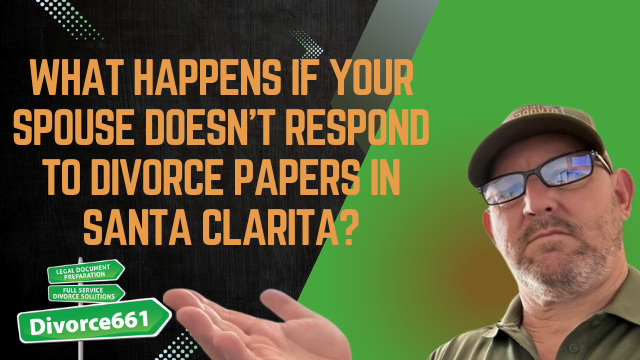What Happens if Your Spouse Doesn’t Respond to Divorce Papers in Santa Clarita?
If you served your spouse with divorce papers in California, there is a clear timeline that can help you move forward even if your spouse refuses to respond. Understanding that timeline and the process that follows empowers you to finalize your divorce without unnecessary court battles, delays, or drama.
California’s 30-Day Rule
Once your spouse has been properly served with divorce papers, they have exactly 30 days to file a response. That 30-day clock is critical. If your spouse does not file a response within that time frame, you have the option to proceed with a default judgment.
A default judgment allows the divorce to be finalized without your spouse participating in the process. It is a legal path to resolution when one party chooses not to cooperate.
What Is a Default Judgment?
A default judgment is the court’s way of concluding the case when the responding party fails to participate. After the 30-day deadline passes with no response, you or your attorney can prepare and file the default paperwork. If everything is in order and service was proper, the court can approve the judgment and finalize the divorce without hearings or contested litigation.
Key points about default judgments
- The process depends on proper service of the divorce papers.
- You must prepare and file accurate default judgment paperwork and supporting documents.
- The court reviews your filings and can approve the judgment without your spouse’s involvement.
- Default does not automatically mean unfair terms. The court expects accurate, complete paperwork that addresses property, debts, support, and custody as applicable.
Why Proper Service Matters
Proper service is the legal foundation of a default process. If service is not done correctly, the court may refuse to proceed with a default judgment. That is why confirming that your spouse was served according to California rules is essential before filing for default.
Proper service and careful tracking of deadlines protect your case and prevent delays. It also reduces the chance that the court will require additional steps or set aside a default later on.
A Real Santa Clarita Example
We helped a Santa Clarita client whose spouse ignored the divorce papers. After the 30-day deadline passed with no response, we filed for default, prepared the judgment, and got the case finalized. No court battle, no drama, just a straightforward path to finalization.
No delays, no drama, just a straightforward path to finalization.
How We Help: Preparing and Filing Your Default
If your spouse does not respond, there are several tasks that must be handled correctly to move forward. Our approach covers those essentials so you can focus on the next chapter.
- Ensure proper service of the paperwork in line with California rules.
- Track all court deadlines to know exactly when you can file for default.
- Prepare accurate default judgment paperwork including all necessary forms and supporting documents.
- File the default with the court and follow up until the case is finalized.
With careful preparation and timely filings, your divorce can be approved without the other party’s participation.
What to Expect After Filing Default
Once default paperwork is filed, the court reviews the paperwork for completeness and compliance. If everything is in order, the court will sign the judgment and your divorce will be finalized. You may not need to appear in court, depending on your county and the complexity of the issues involved.
Keep in mind that while defaults allow finalization without the spouse’s participation, there are legal mechanisms for a spouse to challenge or attempt to set aside a default under limited circumstances. That is why accurate filings and proof of proper service are so important from the start.
Steps to Take If Your Spouse Ignores the Papers
- Confirm that your spouse was properly served according to California rules.
- Wait for the 30-day response period to expire.
- Prepare and file the default and default judgment paperwork with the court.
- Provide any required supporting documents, such as income declarations, property disclosures, and proposed judgment terms.
- Monitor the court for approval and obtain the signed judgment to finalize the divorce.
Final Thoughts and Next Steps
You do not have to be stuck if your spouse refuses to respond to divorce papers. The 30-day rule and the default judgment process provide a clear, efficient path to finalize your divorce. Proper service, accurate paperwork, and timely filing are the keys to a smooth default divorce.
If your spouse is ignoring your divorce papers and you want to move forward with confidence, schedule a free consultation at divorce661.com. We offer flat-fee, full-service assistance to track deadlines, prepare default judgment paperwork, and help you finalize your divorce without unnecessary stress.

